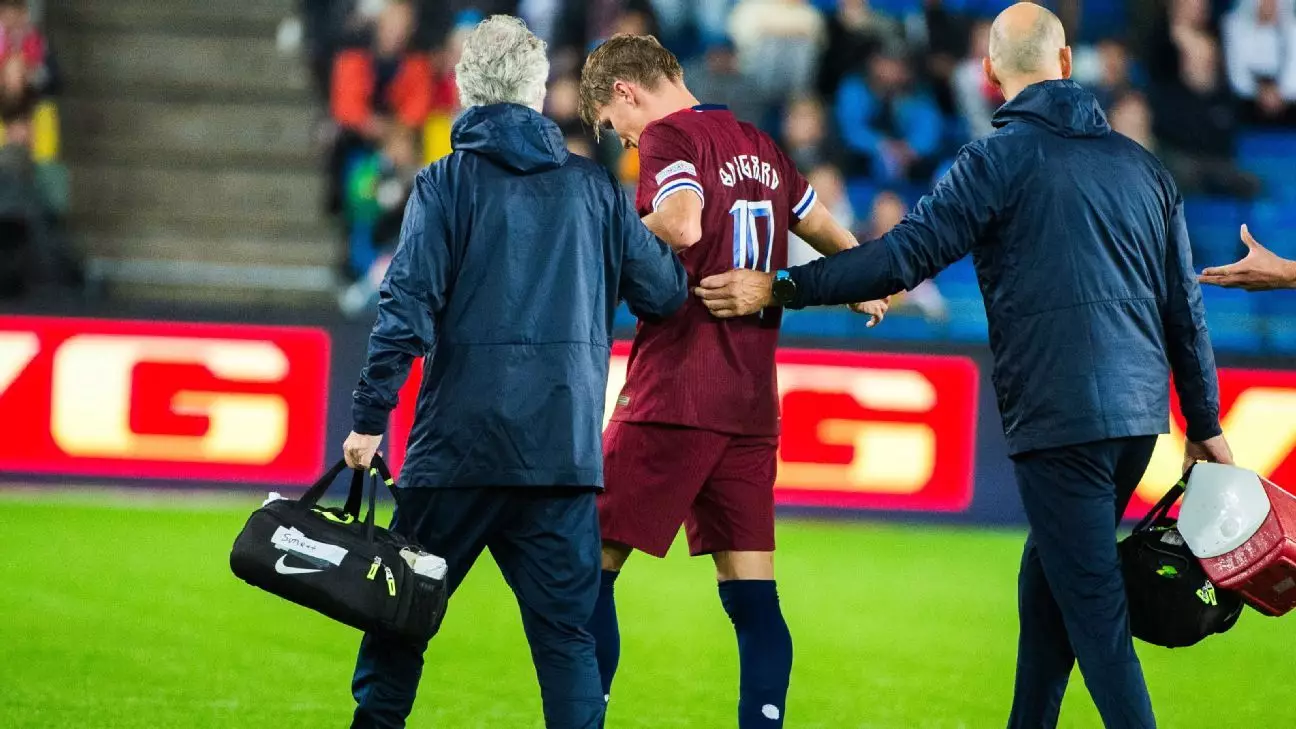In the fast-paced world of professional football, the balance between immediate performance and long-term health often hangs delicately in the balance. This nuance has recently come to the fore regarding Arsenal’s pivotal midfielder, Martin Ødegaard, who has opted out of Norway’s upcoming Nations League fixtures against Slovenia and Kazakhstan. This decision, rooted in sound medical advice and personal insight, highlights the importance of carefully managing player fitness in the wake of injury.
Last week, Ødegaard made his long-awaited return to the field by making a brief cameo appearance in Arsenal’s Champions League match. Despite this milestone, the Norwegian Football Federation announced that he would not be available for national duty, illustrating a prevalent theme in modern sports: the need for careful rehabilitation following injury. Given that Ødegaard had been sidelined for nearly two months due to an ankle issue he sustained while playing for his country, his decision to prioritize recovery over immediate game time underscores a mature and responsible approach to his health.
In a candid statement, Ødegaard noted the challenges of regaining peak performance after a significant absence from competitive play. He stressed the importance of listening to one’s body, indicating his commitment to ensuring his ankle is fully healed before pushing himself back into action. This level of self-awareness is crucial; injured athletes can often feel pressure to rush back into competition, risking further injuries or setbacks.
Norway’s team doctor, Ola Sand, played an instrumental role in guiding Ødegaard’s recovery process. Describing the ankle injury as “complicated,” Sand’s comments emphasize the seriousness of the situation and the necessity for continued rehabilitation. He confirmed that after extensive evaluations, it was determined Ødegaard would benefit more from returning to his club in London rather than participating in the upcoming international matches. This decision reflects a collaborative approach between the player and medical staff, further reinforcing the contemporary emphasis on player welfare in football.
As Ødegaard continues his recovery, Arsenal fans are acutely aware of the impact his absence has had on the team’s performance. While Arsenal managed to secure victories in their first few matches without him, the team has faced challenges in critical games against lower-ranked opponents, accentuating how vital Ødegaard is to their midfield. His vision, creativity, and leadership—qualities that distinguish him as a vital cog in Mikel Arteta’s setup—have been sorely missed.
It’s equally important to recognize the emotional aspect of Ødegaard’s withdrawal from the national team. Representing one’s country is a profound honor for any athlete, and Ødegaard has repeatedly expressed his love for playing for Norway. The disappointment of missing these fixtures is palpable; however, his commitment to his country remains unwavering. He expressed confidence in his teammates to perform admirably in his absence, demonstrating a blend of humility and leadership.
By prioritizing his recovery, Ødegaard can ensure that when he returns to the pitch—be it for Arsenal or the national team—he can contribute at full strength, rather than risk a recurrence of his injury. This forward-thinking mindset is essential not only for his career longevity but also for nurturing the development of younger players looking up to him as a role model.
Ultimately, Ødegaard’s case serves as a microcosm of a larger trend within the footballing world—navigating the tension between competitive ambition and athlete welfare. With the rigors of modern football demanding high levels of physicality and skill, the importance of a well-rounded approach to player health cannot be overstated.
As Ødegaard focuses on his rehabilitation in London, the hope is that his eventual return will coincide with a resurgence in Arsenal’s fortunes. The experience should serve as a reminder to other players about the significance of patience and rigor in recovery; sometimes, stepping back is indeed the best way to move forward.

